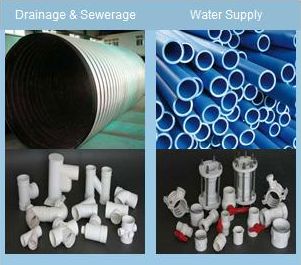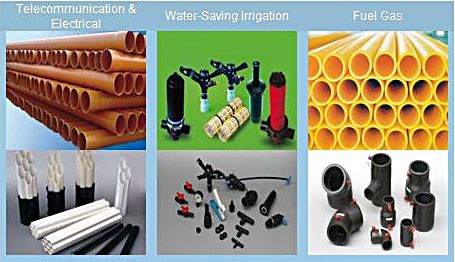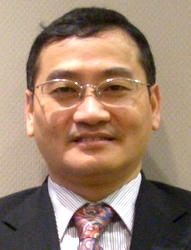
SINOPIPE HOLDINGS, based in Fuqing in southeast China's Fujian Province, makes pipes for use primarily in drainage, sewage and water supply as well as telecommunications and electric power line casings as well as fuel gas supplies.
And while the company is quite dependent on robust housing starts to stimulate demand for its products, its presence in both commercial and industrial properties as well as public works infrastructure prevent it from sinking or swimming with the vagaries of the residential real estate sector.
“In the fourth quarter of 2007 the housing market began to slow, and last year it suffered a severe slump. But 2008 also saw a lot of new non-residential developments and public works projects,” said Sinopipe CEO Chen Lihui.
“But whenever the housing market recovers, we recover, because we are somewhat joined at the hip with them. That said, we are also well hedged as we get a large proportion of our orders from commercial, industrial and infrastructural projects.”
In an exclusive interview with NextInsight, Mr. Chen said that Beijing’s stated goal of narrowing the income gap between the coastal provinces and the hinterlands by raising living standards inland will only boost demand for the myriad of products that Sinopipe produces.
“Agricultural irrigation projects and drinking water delivery systems will grow faster this year, thanks to the government policy,” he said.

Sinopipe benefitted more and more from central government drives to improve water delivery, drainage and sewage systems in underdeveloped central and western provinces, as well as the often unseen miles of plastic pipes and fittings that splay out for miles beneath roads and bridges across the country, as well as electrical and telecommunications-use piping.
Rebuilding homes, lives from disaster
The tragic temblor of May last year in southwestern China’s Sichuan Province and the need to rebuild were also keeping Sinopipe’s assembly lines humming.
"The huge damage (from the earthquake) brings opportunities in terms of meeting reconstruction needs," said Mr. Chen.
The manufacturer has already made provisions to meet the expected spike in demand from village and city officials desperate to repair or rebuild water management systems in the quake-hit regions.
"Repairing damaged pipeworks is a very complicated process, but we are very experienced in the field and up to the task," Mr. Chen added. He said that over the next few years, there will be tens of thousands of new homes and apartments required each year.
"And each will need access to clean water supplies as well as effective sewage systems, all of which require piping of some sort," he said.

"Some of the more rudimentary water delivery and sewage conduit systems damaged or destroyed in the quake can trace their origins back over 300 years," he said.
"Our products can meet many of the needs for all the new construction, rebuilding and pipe networks. It is a very big opportunity for us, and we'll do our utmost to grasp these opportunities."
Beijing giving industry 4.5 trln reasons to smile
Also, the ongoing 4.5 trln yuan economic stimulus package meant to support hard-hit industries across the country amid the economic downturn would inevitably translate to rejuvenated demand for pipes and fittings down the road.
“The stimulus package will also help us rebuild in disaster areas, especially Sichuan, with the government earmarking around 200 mln yuan alone for work there. They encompass several major projects including basic infrastructure rebuilding, airports, agricultural facilities, potable water delivery systems, waste management and organic gas (biofuel) collection. These all offer a huge potential boost for us and should show fast growth this year,” Mr. Chen said.
"The government's desire to boost living standards in the countryside, especially the arid west and northwest, also provides many opportunities, especially for providing clean drinking water and irrigation systems for parched farmland.”
"Our government is struggling to provide for the needs of 32 mln people in rural areas suffering from droughts or inadequate water delivery systems while also practicing environmental conservation. This is also a great opportunity for us as we anticipate the government initiating many more irrigation and water management projects in drought-stricken areas."
And just in case the company’s estimates for public works-related orders are irrationally exuberant to some degree, residential real estate is showing signs of life again in China. “Now the housing market is making a gradual turnaround,” he added.
However, Sinopipe was most sanguine about order strength from public works projects and basic infrastructure as the Middle Kingdom strives to bring its roads, water systems and waste treatment facilities in line with its phenomenal rise to the third largest GDP globally.
Mr. Chen explained that within the public works sector, 40% of its pipes are used in water supply networks, while 30% are used in general infrastructure and construction with the remaining 30% destined for wastewater and sewage systems.
Mr Chen said the group, which listed in December 2005, is seeing strong demand for its polyvinyl chloride (PVC), polyethylene (PE) and polypropylene random (PPR) pipes in China.
"Most older piping systems in China are still made of concrete or metal piping. PVC, PE, and PPR piping systems are now in demand to replace these older piping systems, in addition to demand coming from new construction and infrastructure projects," Chen said.
"This trend will be a main driver of our growth.”

He said that Sinopipe was not idly sitting on the sidelines waiting for the odd year-making government tender order, but was always improving its efficiency, technological expertise and of course quality control practices to become even more competitive when buyers came knocking.
“We’ve implemented a lot of technical upgrading to help expand our market share in China and further expand our product range. While we don’t expect a massive uptick in orders on the back of the stimulus plan, we definitely do expect a trickle down impact of sorts as the money begins to produce results in the economy.”
He said that last year’s record high oil prices (a chief raw material in the production of plastic pipes) was more or less an anomaly, and as the global economy slowed, crude prices softened apace.
And Sinopipe also felt confident that should benchmark prices show a resurgence again anytime soon, the Chinese firm would be able to pass cost increases downstream to end-users, such was the need for plastic pipes and fittings in the country’s building campaign.
“Usually, in times of economic downturn, energy prices – including oil – are also dragged down. Oil prices will not rise quickly anytime soon. That being said, we are also aware that energy supplies are still not fully meeting demand.” Rising raw material costs have had an impact on the company though to a limited extent.
"We produce only plastic pipes, so high commodity prices -- notably copper and aluminum -- have no significant impact on us. And our PVC prices are more or less independent of oil prices."
Chen said that was because PVC production doesn't necessarily require petroleum products as a feedstock.
"However, PE is more hostage to oil prices, and therefore PE prices have risen faster that PVC of late, but despite higher production costs for PE, sustained demand is helping maintain margins for the products. Generally, price hikes for our products are tolerated by the market."
Sinopipe’s fortunes to date have been primarily tied to domestic demand, and this calculus would likely not change anytime soon.
“The domestic market is not overly hit by the global slowdown, as far as our orders reveal. And so far this year our exports have not been noticeably hit. And the threat of rising protectionism and import tariffs overseas is not a major concern for us because our major overseas markets are not the EU and North America,” he said, referring to the two regions often using WTO rules, quotas or tariff adjustments to curtail a sudden surge in Chinese exports.
“Overall, we should see a very slight increase in exports this year.” He said that the global economic crisis is “still quite potent,” and this means that Sinopipe won’t be boosting its proportion of revenue from exports anytime soon.
“But thanks to our heavy reliance on domestic sales, we should be okay.”
He added that Beijing was not ignoring the plight of its exporters, no matter how large their exposure to ex-China sales.
“Before, our export tax rebate was at 5%, but now it is at 11%. And if the export markets slow further, we expect our government to further implement measures to help exporters.”
Asked about possible acquisitions, Chen said the company is not ruling anything out but would examine potential deals on a case by case basis.
Sinopipe saw 2008 revenue of 829.6 mln yuan as compared to 672.6 mln in 2007 as a result of higher revenue generated from the water supply segment, telecommunication and electrical segment and fuel gas segment due to higher business volume from the company's existing customers and new customers secured as the company continued to expand its customer base.
Pipes for water supply and drainage make up around 80 pct of revenue, with "healthy" margins for both types, according to the company.



